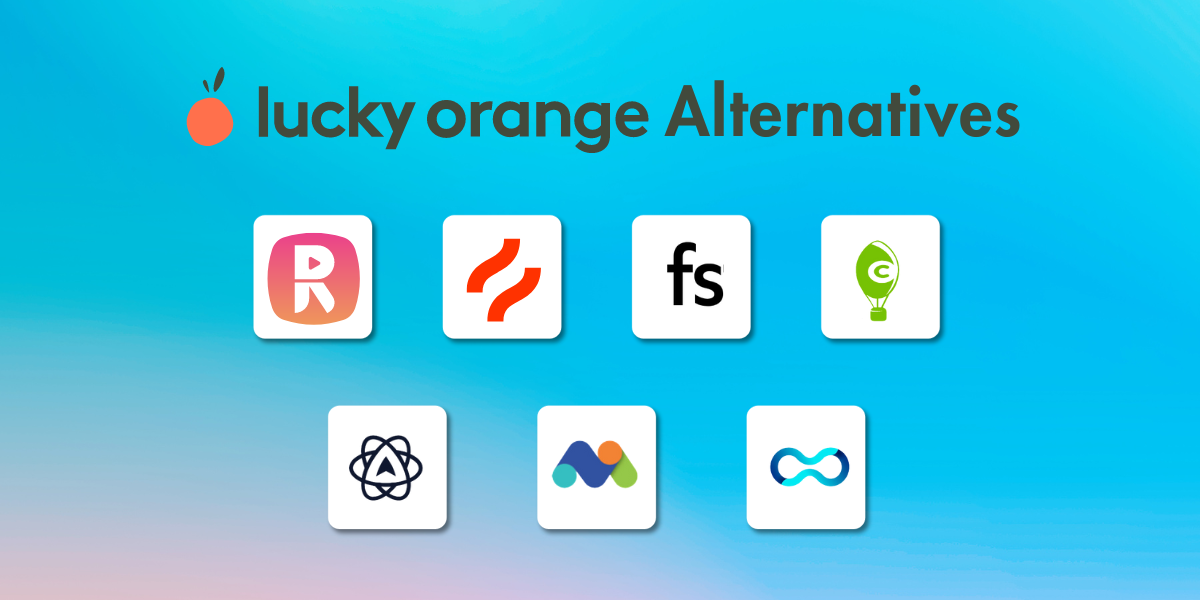Mixpanel vs Amplitude - Two popular platforms that offer event-based analytics solutions as both platforms provide businesses with real-time insights into how users are interacting with their products, but they differ in their approach to analytics and pricing models.
We'll compare their key feature, and pricing plans to understand the differences and similarities between the two platforms.
Whether you're a startup or a large enterprise, this blog post will provide you with the knowledge which will help you to make an informed decision when choosing between Mixpanel vs Amplitude.
What is Mixpanel?
Mixpanel is now a popular business analytics tool among companies that lets teams track user behavior on their business websites and mobile applications. Mixpanel also provides insights into how users are interacting with your product or service by capturing data on their actions, such as clicks, views, and conversions.
With Mixpanel, businesses can create funnels to track user behavior through a series of steps and analyze drop-off points. They can also segment the user base based on various criteria, such as geographic location or behavior, to gain a deeper understanding of their audience.
Mixpanel has a variety of features to help businesses engage with their users and improve their overall experience.
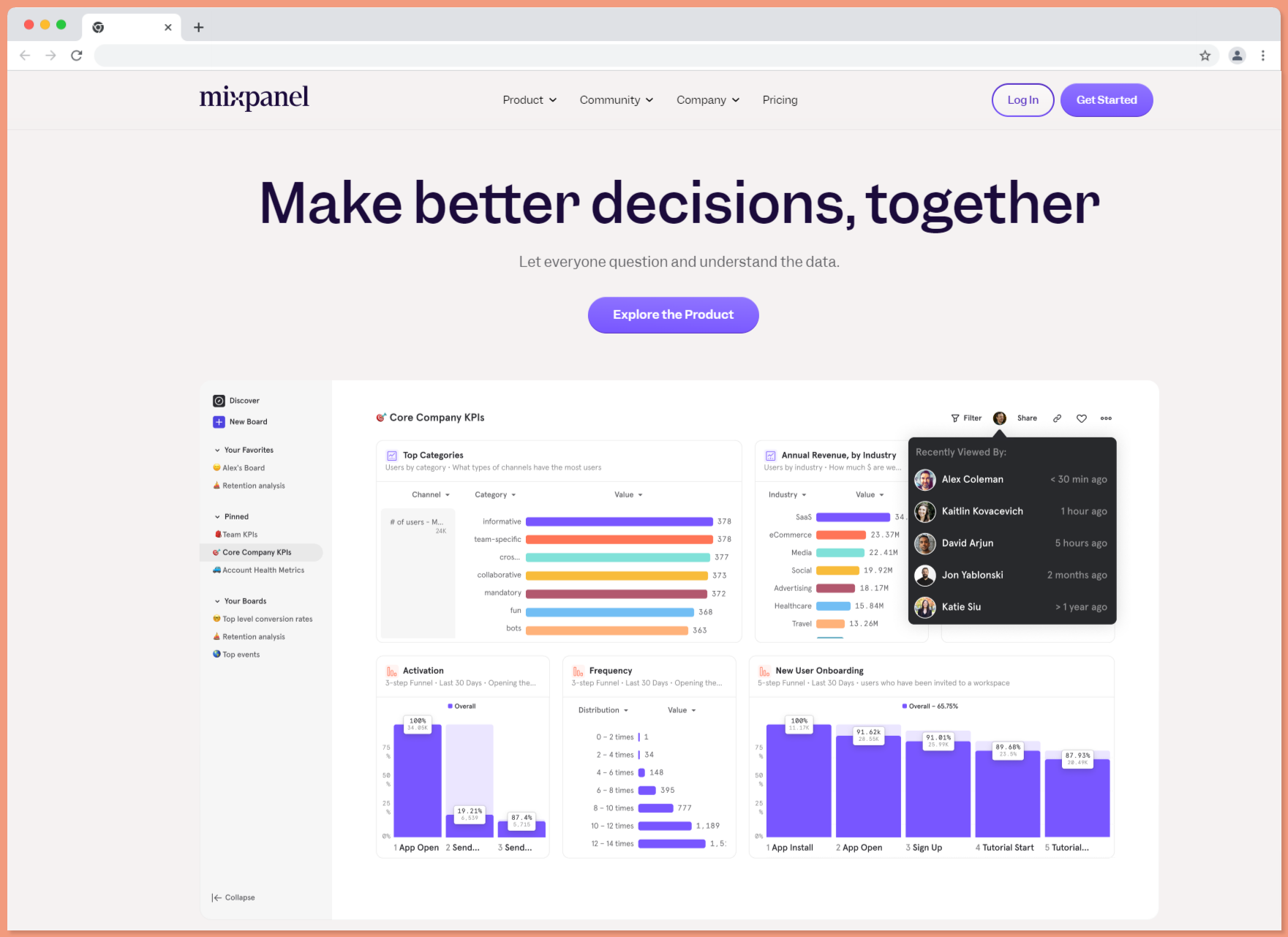
Now let's look at the features of Mixpanel:
- Event Trackings, such as clicks, page views, and purchases, to gain insights into user behavior.
- Funnels to identify where users are dropping off and where improvements can be made.
- User Profiles to understand their users better and create more targeted marketing campaigns.
- Segmentation to tailor their products and services to specific user groups.
- Retention Analysis to understand how often users return to their product or service.
- Notifications send push notifications to users based on specific actions they have taken.
What is Amplitude?
Amplitude is another product analytics platform that is equally popular and very well performing that helps businesses understand user behavior and improve their products and services.
It offers a suite of analytics tools, including event and funnel tracking, cohort analysis, behavioral segmentation, product intelligence, user profiles, and attribution. Amplitude's analytics tools help you to collect, analyze, and act on your business data related to user behavior.
This data can help you understand how users are interacting with your product, which features are most popular, and where users may be experiencing issues, as you can make data-driven decisions about how to improve your product and better serve their customers.
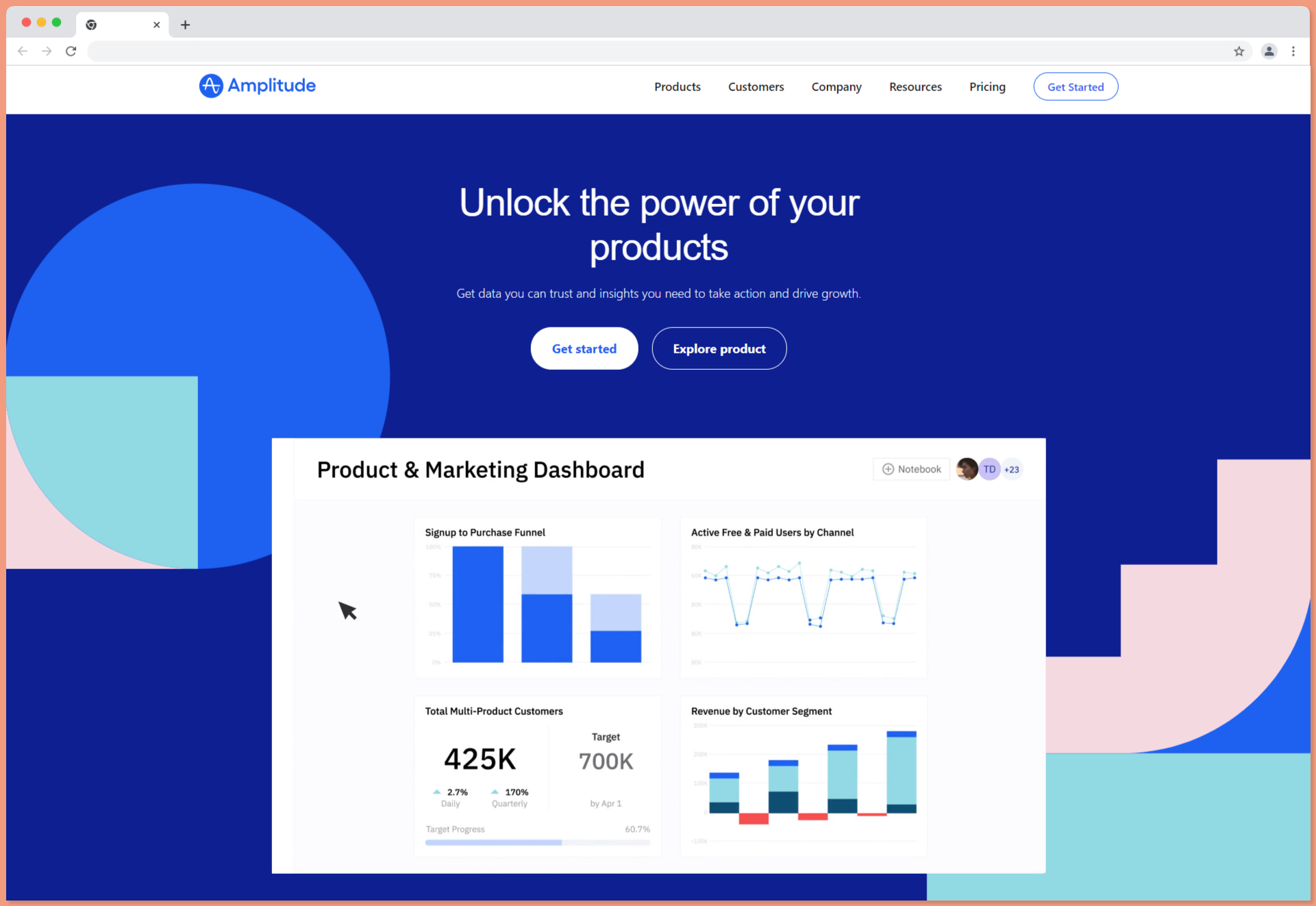
Now let's look at the features of Amplitude:
- Event Trackings to track specific events, such as clicks, page views, and purchases, to gain insights into user behavior.
- Funnels to identify where users are dropping off and where improvements can be made.
- Cohort Analysis to group users based on specific criteria, such as the date they signed up or the product they purchased.
- Behavioral Segmentation to segment users based on how they behave in the app, such as power users or dormant users.
- Product Intelligence to understand the most popular or which actions lead to the most conversions.
- User Profiles to understand your users better and create more targeted marketing campaigns.
- Attribution tracks the source of user acquisition and which marketing channels are driving more traffic.
Why Mixpanel vs Amplitude
Both Mixpanel vs Amplitude offer event-based analytics and funnel tracking capabilities, which are essential for understanding user behavior.
Mixpanel offers segmentation, email campaigns, and notifications, which can be useful for engaging with users and improving the user experience.
Amplitude offers cohort analysis, behavioral segmentation, and product intelligence, which can be useful for understanding how user behavior changes over time and how users interact with specific features.
We will dive more deeper into the metrics and features of Amplitude and Mixpanel that both comparatively miss from each other and which one goes a step further from the other.
Why Amplitude can be better than Mixpanel:
- More intuitive User Interface: Mixpanel's user interface is less intuitive compared to Amplitude, which can make it more challenging and confusing for new users to navigate and use effectively.
- Faster Data Processing: Mixpanel limits the amount of data that can be processed in a given time frame, which can result in delayed data availability and slower data processing. Amplitude, on the other hand, has a faster data processing engine and can handle larger amounts of data with ease.
- Easier Customization: Mixpanel's interface is less customizable compared to Amplitude, making it harder to create custom dashboards and reports. While Amplitude allows more customization, which tailors analytics to specific needs.
- Ample Free Plan: Mixpanel only offers a limited free plan with a cap on data points and users. In contrast, Amplitude has a more generous free plan that allows up to 10 million events per month and unlimited users.
Why Mixpanel can be better than Amplitude:
- Better Segmentation Capabilities: While Amplitude offers some segmentation capabilities, they are not as advanced as those offered by Mixpanel. Mixpanel allows for more complex queries and segmentation options, which can analyze user behavior in greater detail.
- Easier Integrations: Amplitude has fewer integrations with other tools and platforms compared to Mixpanel, which can limit its usefulness for businesses that require integrations with specific software or services.
- Cost-effective Pricing for Small Businesses: While Amplitude's pricing model may be more cost-effective with high traffic, it can be more expensive for businesses with smaller user bases. This is because Amplitude's pricing is based on the number of events tracked, whereas Mixpanel's pricing is based on the amount of data processed.
- Learning Curve: While Amplitude's interface is more user-friendly than Mixpanel's, there is still a learning curve for new users. It can take some time to learn how to use the tool effectively and make the most of its features.
Comparing Mixpanel vs Amplitude Event-Based Analytics
Mixpanel vs Amplitude: Product Analytics
#1 Sessions:
Mixpanel and Amplitude offer user session tracking, which allows businesses to track only user activity within a single session as metrics.
Replaybird goes a step further and provides session replay, which enables businesses to watch recorded user sessions in real-time.
#2 Funnel
Mixpanel's funnel analysis feature offers real-time updates and allows for customizable funnels that track specific user actions and events. Additionally, users can segment the funnel data by different attributes like user demographics or behavior.
Amplitude's funnel analysis feature offers breakdowns of the funnel data by different attributes like user demographics or behavior, multiple path analysis, and user-level funnel analysis, providing insights into the specific actions that users take as they progress through the funnel.
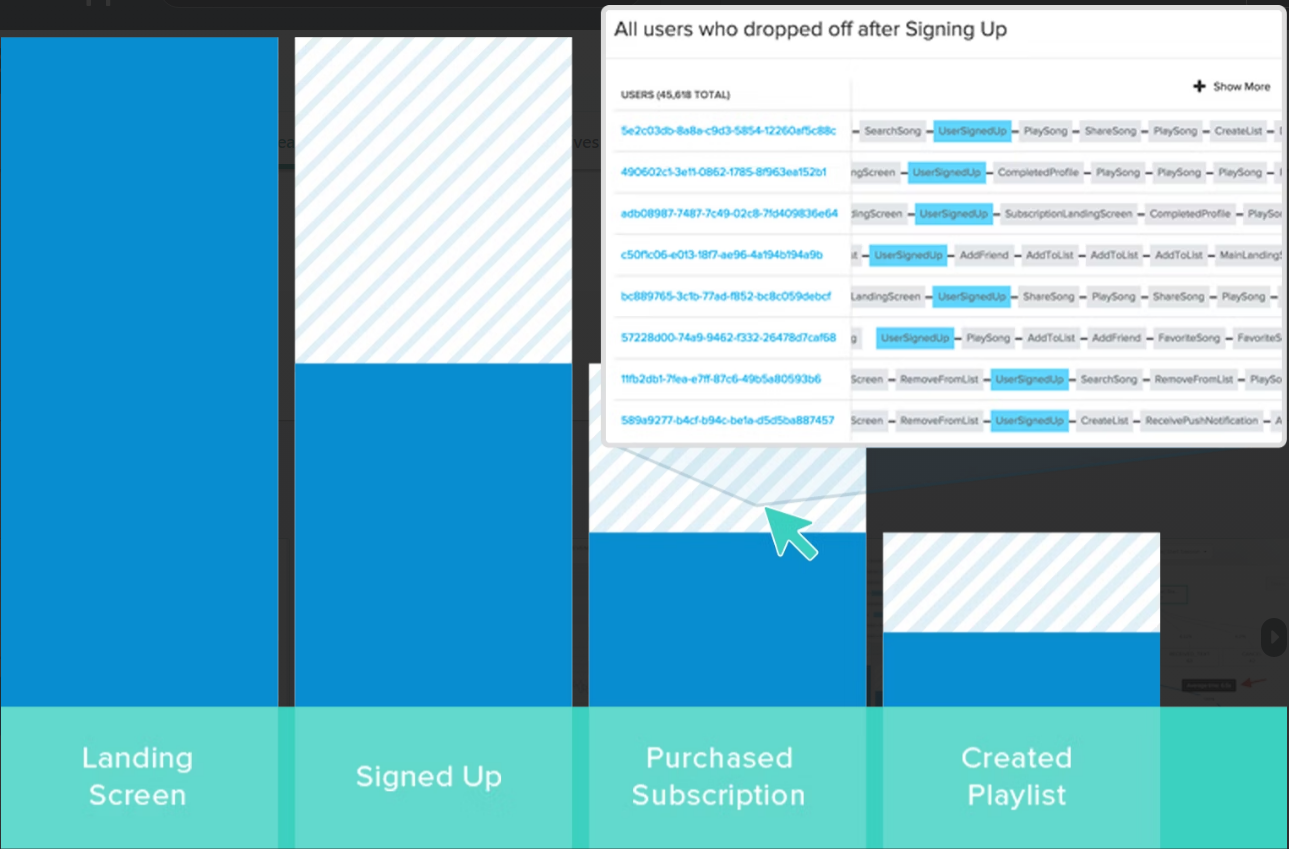
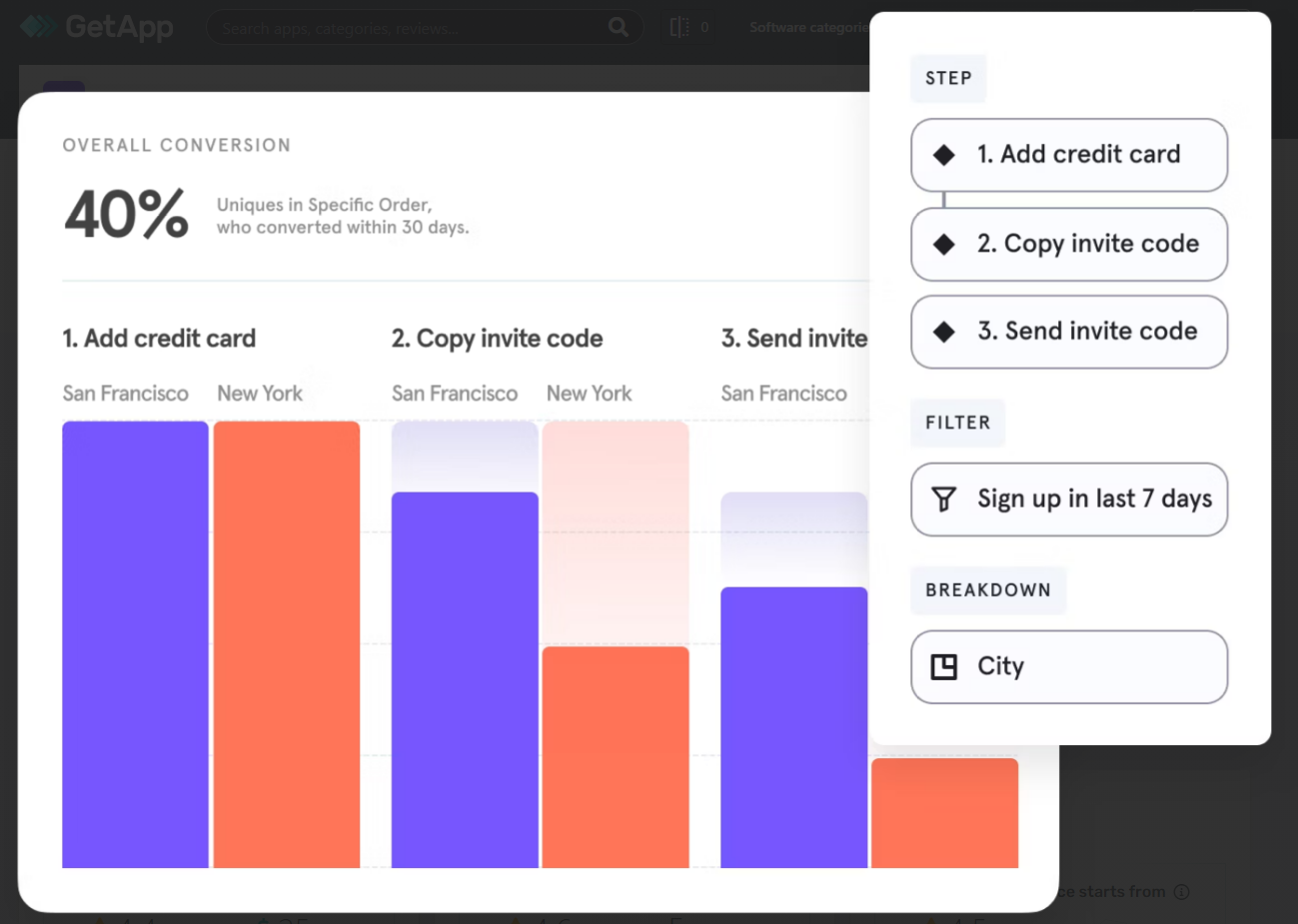
#5 Entry and Exit Pages:
Mixpanel provides entry and exit page tracking through its path reports, which allows users to see where users enter and exit the product. Amplitude provides entry and exit page tracking through its user flows feature, which visualizes the paths users take through the product and identifies entry and exit points.
#6 Retention:
Mixpanel provides retention analysis through its retention reports, which show how many users return to the product after their first visit. Amplitude provides retention analysis through its retention cohorts feature, which allows users to segment users based on their behavior and analyze their retention over time.
#7 Conversions:
Mixpanel provides conversion tracking through its funnels feature, which allows users to track user progress through specific flows in the product. Amplitude provides conversion tracking through its conversion analysis feature, which allows users to track the conversion rate of users based on specific events or behaviors.
#8 Exit Tracking:
Mixpanel provides exit tracking through its path reports, which allows users to see where users exit the product. Amplitude provides exit tracking through its user flows feature, which visualizes the paths users take through the product and identifies exit points.
#9 Engagement:
Mixpanel provides engagement reports to help track user activity and behavior over time, while Amplitude measures engagement through its behavioral cohorts feature, which allows users to segment users based on their behavior and analyze their engagement. Mixpanel's engagement reports provide more detailed information about user activity and behavior, while Amplitude's behavioral cohorts offer a more targeted approach to analyzing user engagement.
#10 Standard Event Tracking:
Both Mixpanel and Amplitude offer standard event tracking to help users understand how users interact with their products. However, Mixpanel offers a more customizable approach to standard event tracking with its event tracking API, while Amplitude provides pre-built event libraries for popular platforms like iOS and Android.
#11 Custom Event Tracking:
Mixpanel allows users to track custom events with its event tracking API, which provides a high degree of customization and flexibility. Amplitude also allows users to track custom events through its events manager, but the level of customization is not as robust as Mixpanel's event-tracking API.
#12 Return:
Mixpanel measures return visits through its retention reports, which show how many users return to the product after their first visit. Amplitude measures return visits through its behavioral cohorts feature, which allows users to segment users based on their behavior and analyze their return rate over time. Both Mixpanel and Amplitude offer similar capabilities for tracking return visits, but the specific features and functionality may vary.
#13 Unification Across Devices:
Mixpanel provides cross-device analytics through its people profiles feature, which allows users to track individual users across devices. Amplitude provides cross-device analytics through its cross-platform user analysis feature, which allows users to track users across different platforms. Both tools offer similar capabilities for tracking user behavior across devices, but the specific features and functionality may vary.
#14 User-Level Analytics:
Mixpanel provides user-level analytics through its people profiles feature, which allows users to track individual users and their behavior over time. Amplitude provides user-level analytics through its user profiles feature, which allows users to track individual users and their behavior across different platforms and devices. While both tools offer similar capabilities for user-level analytics, the specific features and functionality may differ.
Mixpanel vs Amplitude: User Analysis and Identification
Mixpanel assigns a distinct ID to each user, which allows users to track behavior over time and across devices. Mixpanel also provides user profiles that allow users to track additional information about their users. Additionally, Mixpanel allows users to create an alias for a user, which allows them to merge multiple user profiles into a single profile if the same user is using multiple devices or if the user changes their email address.
Amplitude also assigns a distinct ID to each user and provides user properties to track additional information about users. However, unlike Mixpanel, Amplitude does not provide a built-in alias feature. Instead, users can use a combination of techniques, such as tracking IP addresses or device IDs, to try to merge user profiles manually.
Mixpanel vs Amplitude: Dashboard
Mixpanel's dashboard provides real-time updates and allows users to create custom events. On the other hand, Amplitude's dashboard provides insights into user behavior and allows users to create behavioral cohorts.
Mixpanel's real-time updates feature can be useful for users who need to monitor their product or service in real-time, such as during a product launch or event. Additionally, Mixpanel's custom events feature allows users to track specific actions that users take in their product or service, providing more granular insights into user behavior.
Amplitude's insights into user behavior can be useful for users who want to understand how users are interacting with their product or service over time. Amplitude's behavioral cohorts feature also allows users to create cohorts based on user behavior, providing insights into how different types of users behave.
Mixpanel vs Amplitude: Data Storage
Data retention: Mixpanel allows users to retain data for a longer period (25 months) than Amplitude (13 months) by default. However, both platforms allow users to choose to retain data for a longer period if needed.
Data processing: Mixpanel processes user data in batches, meaning that it may take some time before new data is available for analysis. Amplitude, on the other hand, processes user data in real-time, allowing users to analyze and act on data as soon as it is collected.
Data export: Mixpanel allows users to export data in JSON, CSV, or Excel formats, while Amplitude provides additional export options, such as SQL, API, and BigQuery.
Data visualization: Mixpanel provides various data visualization tools to help users analyze their data, including charts, graphs, and dashboards. Amplitude also provides these features but also includes a library of pre-built data visualizations, which can be helpful for users who want to quickly explore their data.
Data modeling: Amplitude provides a feature called "Behaviors", which allows users to create custom data models based on user behavior. This can be useful for users who want to analyze data in a more structured way.
Mixpanel vs Amplitude: Integration
- Pre-built Integrations:
Mixpanel offers more than 200 pre-built integrations with a wide range of third-party tools and platforms, including popular marketing automation tools, CRMs, and customer support software. Amplitude has around 150 pre-built integrations, including popular marketing automation tools and CRMs. Both tools offer APIs for custom integrations. - Custom Integrations:
Both Mixpanel and Amplitude offer APIs that allow businesses to build custom integrations with their own tools and platforms. Mixpanel's API is highly customizable and offers a wide range of functionality, while Amplitude's API is more limited. - Integration with E-commerce Platforms:
Mixpanel offers integrations with popular e-commerce platforms like Shopify and Magento, allowing businesses to track user behavior and metrics on their e-commerce sites. Amplitude does not offer pre-built integrations with e-commerce platforms.
Mixpanel vs Amplitude: Reports
Mixpanel provides a flexible reporting interface that allows users to create custom reports based on specific metrics and events. Mixpanel offers various types of reports, including trend reports, segmentation reports, and funnel reports.
Segmentation reports in Mixpanel allow users to slice and dice data based on various dimensions, such as geography, device type, and user properties. Users can create complex segmentation reports by combining multiple dimensions and metrics.
Funnel reports in Mixpanel show how users move through a series of events or steps in a funnel. Users can customize funnel reports by selecting the steps, time range, and comparison periods.
Whereas, Amplitude provides a powerful reporting interface that allows users to create custom reports based on specific metrics and events. Amplitude offers various types of reports, including trend reports, cohort reports, and path analysis reports.
Cohort analysis reports in Amplitude allow users to analyze user behavior over time based on specific cohorts, such as users who signed up in a specific month or users who completed a specific event. Users can create complex cohort reports by combining multiple cohorts and metrics.
Path analysis reports in Amplitude show how users move through a series of events or steps in a path. Users can customize path analysis reports by selecting the events, time range, and comparison periods.
Mixpanel vs Amplitude: Pricing
Both event-based analytics, Mixpanel vs Amplitude are popular platforms that offer businesses insights into user behavior, engagement, and retention. Each platform has its own pricing model based on different metrics such as data points, monthly active users, and monthly sessions.
In this comparison, we will take a closer look at the pricing plans offered by these two platforms to help businesses make an informed decision when choosing a platform that best fits their needs and budget.
Mixpanel Pricing:
Mixpanel offers a free plan with limited features and a pricing model based on data points, which starts at $833 per year for up to 100,000 data points per month. The pricing goes up as the data points increase, and custom pricing is available for larger organizations.
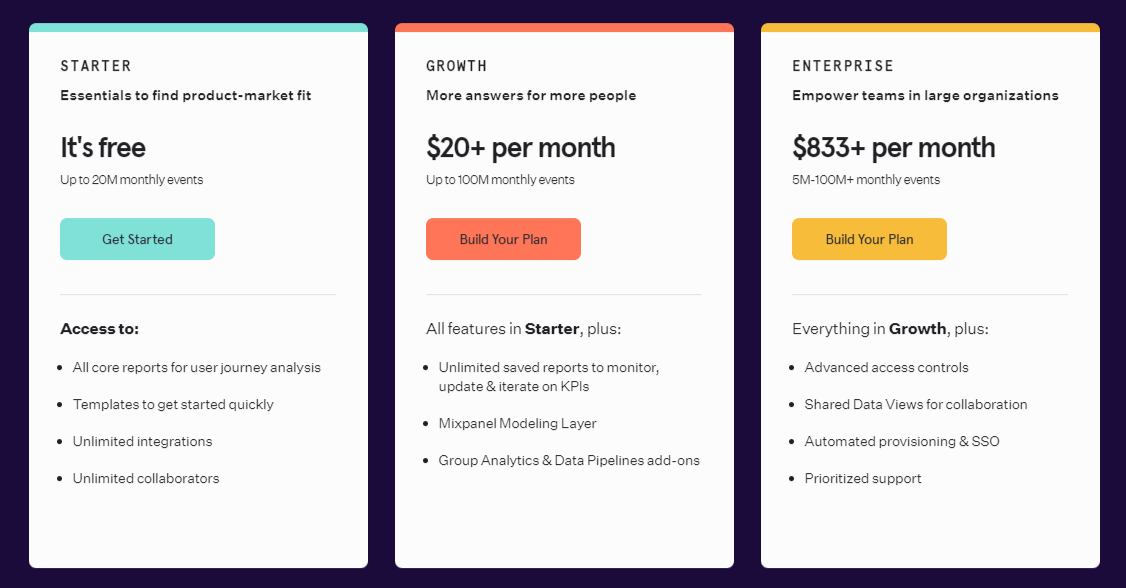
Amplitude Pricing:
Amplitude offers a free plan with limited features and a pricing model based on monthly active users (MAUs) pricing is not transparent to the buyers. The pricing goes down, as the MAUs increase and custom pricing is available for larger organizations. That is you need to contact the team to know the Amplitude pricing.
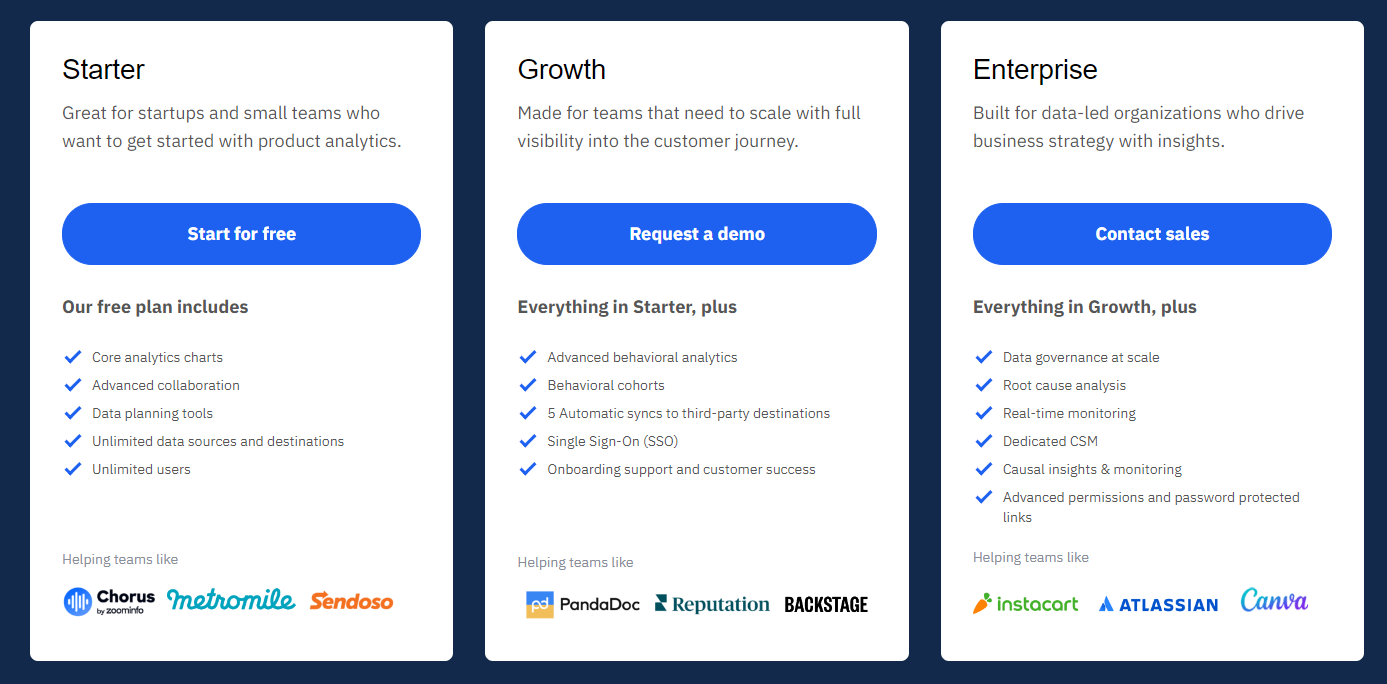
A Better Alternative to Mixpanel & Amplitude - ReplayBird
Now let me tell you a little secret to hack this terms of product analytics. Have you come across ReplayBird before?
ReplayBird can be the best choice for finding a better product analytics tool compared to Mixpanel and Amplitude.
I am telling this in order to businesses to attain more affordable and more effective product analytics tools that let you unlock all the insight into individual user behavior as it offers features such as session replay, product analytics, insights, path analysis, and error analysis that can help businesses understand how users are interacting with their product and identify any issues that need to be addressed instantly.
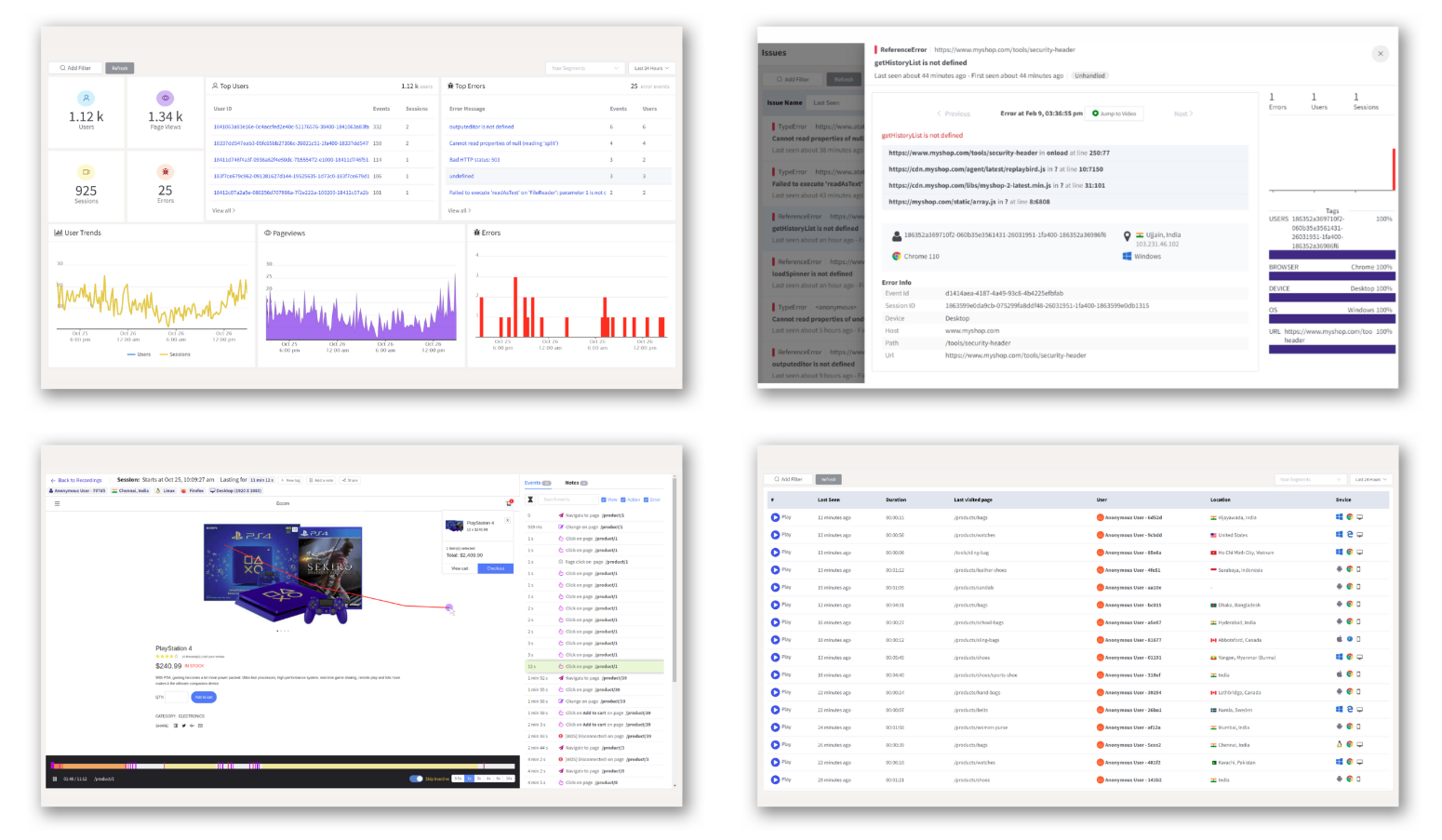
Replaybird Pricing:
Replaybird offers a free plan with limited features and a pricing model based on monthly sessions, which starts at $39 per month for up to 5,000 sessions. The pricing goes up as the sessions increase, and custom pricing is available for larger organizations.
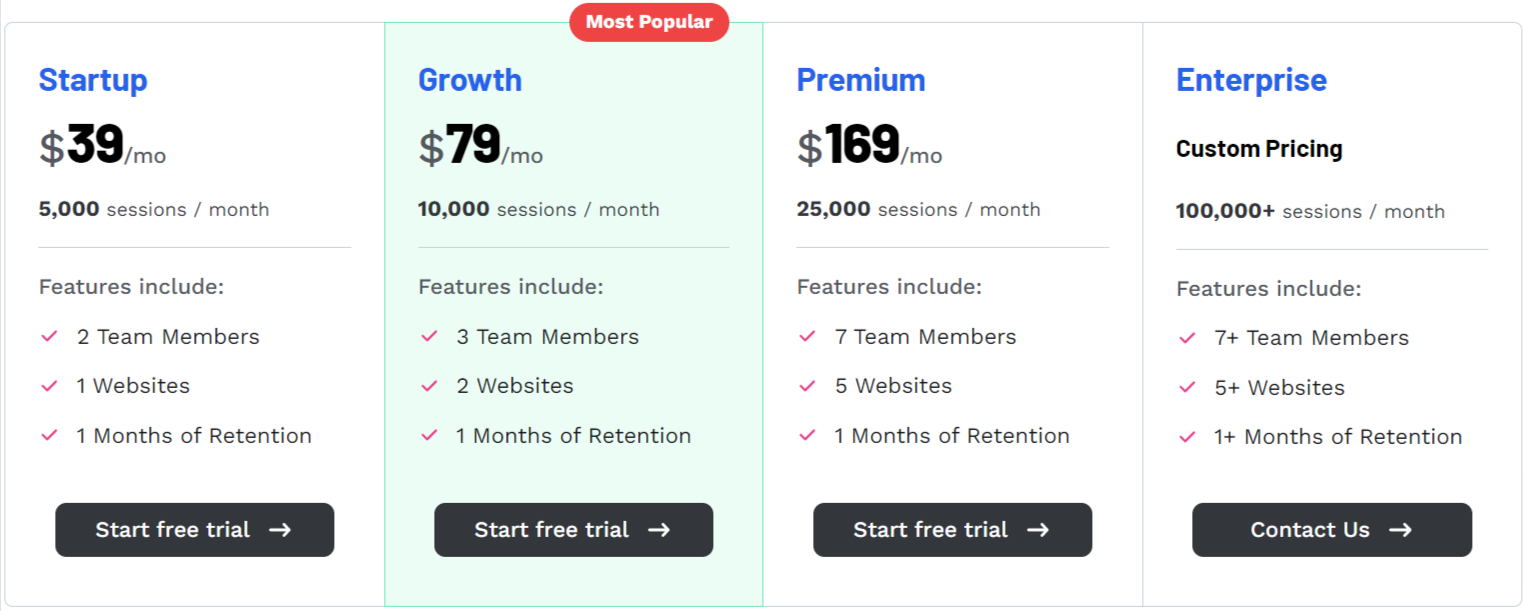
ReplayBird offers some unique features that differentiate it from Mixpanel and Amplitude. ReplayBird's standout product analytics feature is its detailed path analysis, funnel analysis, and session replay capability, which allows users to watch a recording of a user's interaction with a website or app in real-time. This can be useful for debugging issues, identifying user experience problems, and optimizing a website or app design.
In addition to its session replay feature, Replaybird also offers JavaScript error analysis. This allows users to detect and diagnose errors that occur on their websites or applications, such as syntax errors, runtime errors, and network errors.
Replaybird's JavaScript error analysis provides detailed information about each error, including the error message, stack trace, and affected browser and device. Users can also receive notifications when errors occur and track error rates over time.
Try ReplayBird 14-days free trial
Conclusion:
In conclusion, both Mixpanel and Amplitude offer powerful analytics tools that can help businesses gain valuable insights into user behavior and optimize their websites and applications. While there are some differences between the two tools, both offer robust event tracking, funnel analysis, user segmentation, and A/B testing capabilities.
Mixpanel is a well-established analytics tool that has been in the market for over a decade. It has a strong focus on product analytics and is popular among product managers and data analysts.
Amplitude, on the other hand, emphasizes user behavior and engagement and offers features such as behavioral cohorts and user retention analysis. Its analytics platform is designed to be easy to use, even for those without a strong technical background.
Both Mixpanel and Amplitude offer powerful analytics capabilities, and businesses should evaluate each tool's features, pricing, and support options to determine which one is the best fit for their needs.
Further Readings:








